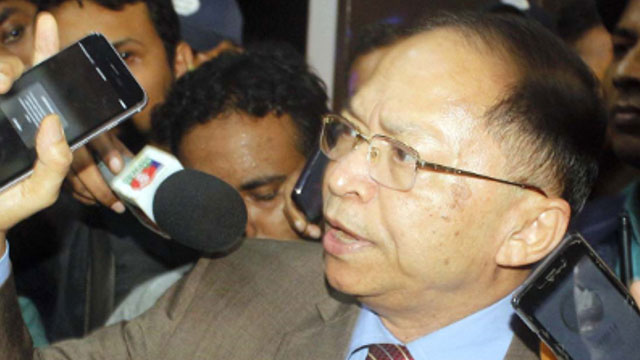The trial of former chief justice Surendra Kumar Sinha and 10 others began on Tuesday with Anti-Corruption Commission director Syed Iqbal Hossain testifying against them in a case he filed accusing them of misappropriation and laundering of Tk 4 crore from Farmers Bank, now renamed as Padma Bank.
Dhaka Special Judge’s Court 4 judge Shaikh Nazmul Haque began the trial examining Syed Iqbal, as the plaintiff the first prosecution witness in the first ever corruption case filed against a former chief justice on July 10, 2019.
In the cross-examination by defence lawyer Shahinur Islam, the plaintiff said that he could not remember whether he had scrutinised and reviewed all the documents, including the loan application form, guarantor and mortgaged properties.
He said that he did not know whether Tk 4,92,742 had been repaid in the principal amount and its interest until Monday.
On completion of the cross-examination, the court set August 25 for recording the testimony of the next prosecution witness.
Seven accused in the case were in the dock.
The prison authorities produced former Farmers Bank audit committee chairman Mahbubul Haque Chisty before the court.
The bank’s former chief executive officer AKM Shameem and senior executive vice-president Gazi Salauddin, who are now on bail, have appeared before the court.
The bank’s credit division first vice-president Swapan Kumar Roy, vice-president Lutful Haque and Shahjahan of Sriharipur village and farmer Niranjan Chandra Saha of Jadunathpur village in Tangail surrendered to the court seeking bail and the court allowed their prayers.
Justice Sinha, the bank’s first vice-president Shafiuddin Askaree and its client Ranajit Chandra Saha of Jadunathpur village in Tangail and his wife Santri Roy, are being tried in their absence. Ranjit was shown in the case as Justice Sinha’s private secretary.
After surrender, the court asked Niranjan and Shajahan about their professions and Niranjan said that he was a farmer while Shajahan replied that he was a kindergarten teacher.
They said that they were very poor ones and that they, being insisted, signed the loan application forms.
The loan application form mentioned that the loan applicants were sweetmeat traders.
In his testimony, Iqbal said that M Shahjahan and Niranjan opened two current accounts with Gulshan Corporate Branch of Farmers Bank Limited on November 6, 2016 showing a Uttara house in Dhaka that belonged to Justice Sinha.
On November 7, 2016, they applied for Tk 4 crore loan.
The then branch manager and others signed the applications without any scrutiny on the same day and forwarded the sanction letters to the bank’s principal office for disbursement of the loan, Iqbal testified.
On November 8, 2016, the principal officer, violating the bank rules and regulations, issued two pay orders of Tk 4 crore in the name of M Shahjahan and Niranjan Chandra Saha, said the plaintiff.
On November 9, 2016, the amount was deposited to a savings account of Justice Sinha at the Supreme Court Branch of Sonali Bank Limited, he testified, adding that the former chief justice had withdrawn the money on different dates and transferred those to different places.
The plaintiff testified that the accused submitted a deed of 32 decimal property of Santri Roy at Savar which did not fulfill the terms and conditions of bank rules.
On August 13, 2020, the same court charged the 11 people.
On December 10, 2019, the commission’s investigation officer Benzir Ahmed submitted the charge sheet against the 11.
On January 5, 2020, Dhaka senior special judge KM Imrul Kayes accepted the charge sheet.
The inquiry began on April 25, 2018, four months and a half after Justice Sinha resigned as the chief justice on November 10, 2017 amid serious controversies following a unanimous Appellate Division verdict.
The verdict upheld a High Court judgement striking down the 16th Amendment to the constitution which had restored the Jatiya Sangsad’s power to remove Supreme Court judges for misconduct or incapability.
Immediately after Justice Sinha’s resignation, law minister Anisul Huq said that the law would take its own course with regard to the 11 allegations brought against Justice Sinha by five fellow Appellate Division judges.
Justice Sinha, now reportedly in the United States, sent his letter of resignation through the Bangladesh High Commissioner to Singapore while he was there on his way to Australia.
On October 2, 2018, the law minister announced that Justice Sinha had expressed his desire to go on leave for a month with effect from October 3, 2018 saying that he was suffering from cancer and other diseases.
On October 13, 2018, Justice Sinha left for Australia.
While leaving his official residence for the airport on the day, Justice Sinha told the waiting reporters in a written statement that he was going abroad for the time being and would return soon.
On August 1, 2018, the Appellate Division had released its full verdict on the 16th amendment.
Justice SK Sinha, in his a book titled ‘A Broken Dream: Rule of Law, Human Rights and Democracy’ published in 2019 from the US said that he was forced to leave the country after he penned the unanimous verdict on the 16th amendment to the constitution.
Justice SK Sinha also claimed in the book that the money in question was transferred to his bank account as the sale proceeds of his house.





